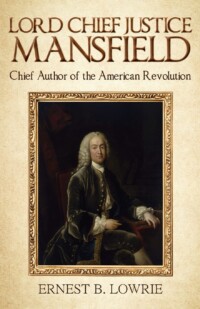Title: Lord Chief Justice Mansfield: Chief Author of the American Revolution
Author: Ernest B. Lowrie
Publisher: Ewings Publishing LLC
ISBN: 978-1480828520
Pages: 478
Genre: Historical biography
Reviewed by: Michaela Gordoni
Pacific Book Review
Lord Chief Justice Mansfield: Chief Author of the American Revolution is an exhaustive and extremely thorough reflection on William Murray, (Lord Chief Justice Mansfield) and his influence on the American revolution. He was a Solicitor General, Attorney General, and of course a Lord Chief Justice, but also an Earl whose “understanding of contract law has stood the test of time.” Even though Mansfield was a Scottish man who has never been to America or even knew many Americans, author Ernest B. Lowrie argues that he was critical to the instigation of the epic war known as the American Revolution.
The author takes the reader through Mansfield’s life starting from his younger years and recounts the events that were happening around each corresponding age. Although Mansfield is clearly the focus of the book, Ernest B. Lowrie takes thorough care to incorporate every possible relevant historical detail, event, and figure. Ernest B. Lowrie writes not only of Mansfield’s lifetime accomplishments, but also of his lasting legacy and impact on the legal system that has trickled its way down into our modern day. And of course, had Mansfield ceased to influence the revolution things might be very different.
Ernest B. Lowrie writes in a very graceful, formal, and educated tone, containing little opinion. It gives the impression that he is only interested in delivering only absolute facts, a trait that many history readers will appreciate. Readers might also enjoy Ernest B. Lowrie’s use of authentic quotes, not just from Lord Chief Justice Mansfield but other notable figures like Benjamin Franklin. Some scholars might be interested to know that while the work certainly does contain a bibliography, it is placed in the back pages; citations are not listed on the pages giving references themselves.
It is to be certain, lengthy and unalike other works that reflect on Lord Chief Mansfield, this one does not deeply delve into his influence on slavery abolition. Nevertheless, certainly, this is a great book for American History buffs and a great resource for legal and history scholars as well. Ernest B. Lowrie makes Mansfield’s intelligence obvious, and anyone that reads Lord Chief Justice Mansfield: Chief Author of the American Revolution, will surely come away from it convinced that Mansfield played a major card in the initiation of the American Revolution.


